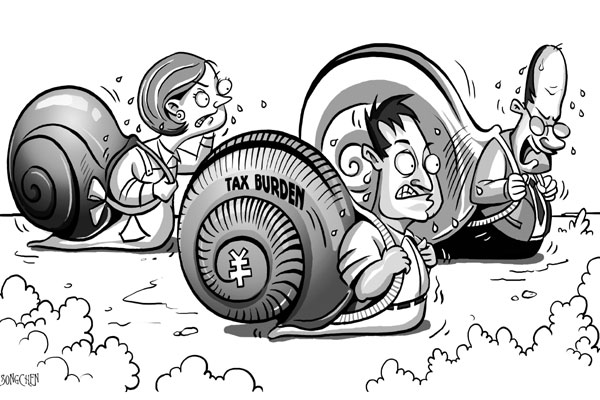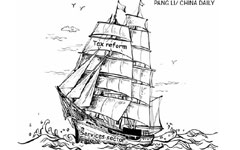The dialectics of China's tax burden
Updated: 2014-03-04 08:22
By Yang Guoying (China Daily)
|
|||||||||||
|
 |
|
Song Chen / China Daily |
Some experts have claimed that the "per capita tax burden" in China is close to 10,000 yuan ($1,633). Although scholars with the Ministry of Finance have refuted the claim, the issue has sparked a heated public debate.
"Per capita tax burden" is the same as "per capita fiscal revenue". The official explanation, objective and accurate as it is, makes it clear that the two expressions are nothing but fiscal revenue and expenditure, and compared with advanced countries, China's macro tax burden is just about 10 percent higher.
|
 |
 |
For individuals as well as companies, the concept of rising tax burden is, at the most, a decade old. According to official data, the macro tax burden in China, which is the ratio of fiscal revenue accounting for its GDP, increased from 16 percent in 2003 to 22.7 percent in 2013. This is understandable because as an emerging economy, China has to increase its investments in infrastructure and other projects to improve people's livelihoods, and the money for that has to come from higher tax revenue.
We will not understand the tax bearing level without analyzing the per capita income and benefit levels in society. It is true that the macro tax burden in China is just one-tenth that of developed economies, but China's average financial revenue, also called per capita tax burden, is close to the level of advanced economies. Besides, China's social welfare expenditure accounts only for 35 percent of the total expenditure now, which is much lower than the 70 percent ratio in advanced economies. Therefore, the governmental scholars cannot directly deduce that tax pressure is not heavy in China.
It is important, too, to understand the constitution of the macro tax burden, which is the key to the discussion on whether the tax burden is high or low. Different from some countries, the macro tax burden in China includes not only budget revenue (mainly tax revenue), but also off-budget revenue, government funds, incomes generated from paid land use and social security fund. And in the past years almost half of local governments' fiscal revenue has come from income from land, which eventually accrues from individual homebuyers through rising housing prices. This is the reason why more people feel that the tax pressure is high.
Related Stories
VAT reform exemptions huge in 2013 2014-02-28 16:05
Property tax trials yielding meager results, say analysts 2014-02-19 08:52
Currency tax under consideration: SAFE 2014-01-04 01:53
Workers to pay income tax for annuities 2013-12-07 10:40
Value-added tax reform expands 2013-12-05 00:05
Today's Top News
Last 3 suspects caught in Kunming manhunt
Ukraine crisis hits Poland economy
Geely buys British startup Emerald
CNOOC licensed to seek Arctic oil
CNOOC licensed to seek Arctic oil
G7 leaders condemn Russia over Ukraine
Terrorist group in Kunming attack busted
Political advisers vow to help deepen reforms
Hot Topics
Lunar probe , China growth forecasts, Emission rules get tougher, China seen through 'colored lens', International board,
Editor's Picks

|

|

|

|

|

|





